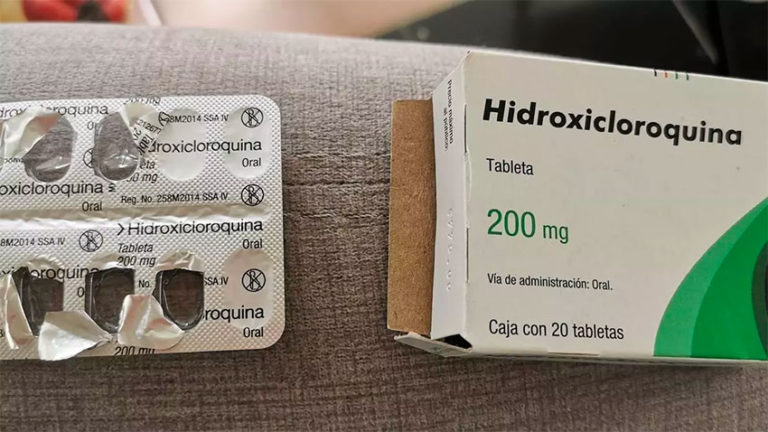Outpatients will be given low to medium doses for a maximum of seven days
by Mexico News Daily
MEXICO, May 23, 2020 – The federal Health Ministry will use the anti-malaria drug hydroxychloroquine to treat 20,000 Covid-19 outpatients despite doubts about its efficacy and the risk of it causing an irregular heartbeat and even death.
The director of the National Institute of Medical Sciences and Nutrition told the newspaper Milenio that the health regulatory agency Cofepris has authorized the administration of the drug to patients recovering from Covid-19 in their homes.
José Sifuentes acknowledged that clinical trials have shown that high doses of hydroxychloroquine for a prolonged period of time can cause a range of side effects in Covid-19 patients but emphasized that the drug has been shown to reduce generalized inflammation in people with the disease.
In that context, he stressed that outpatients will be given only low to medium doses for a maximum of seven days starting in the early phase of their illness.
Sifuentes said that all patients receiving treatment with the drug will be closely monitored, explaining that the “careful follow-up” will occur at people’s homes and via telephone and video calls.
He said that 130,000 doses of hydroxychloroquine donated by the Swiss healthcare company Novartis will be distributed to national health institutes, regional hospitals and specialty hospitals, among other facilities. The use of the drug among ambulatory Covid-19 patients will commence next week.
The announcement of the plan came just two days after the World Health Organization (WHO) reiterated that the drug should only be used in closely-monitored clinical trials due to the potential side effects.
Michael Ryan, executive director of the WHO health emergencies program, said that hydroxychloroquine and the similar drug chloroquine have “yet to be found effective in the treatment of Covid-19” or to prevent the disease.
The medical journal The Lancet published a study on Friday that said that there were no benefits to treating Covid-19 with either drug and that their use actually increases the risk of dying for coronavirus patients.
In a study of 96,000 coronavirus patients, 18 percent treated with hydroxychloroquine and 16.4 percent of those treated with chloroquine died. For patients in a control group, the death rate was 9 percent.
Deputy Health Minister Hugo López-Gatell, Mexico’s coronavirus point man, is among a large number of medical professionals who have warned against taking hydroxychloroquine as a preventative measure against Covid-19.
But United States President Donald Trump, who has repeatedly promoted the drug as a Covid-19 treatment, was not dissuaded from using it to try to stave off Covid-19, the disease caused by the new coronavirus.
“A lot of good things have come out about the hydroxy, you’d be surprised about how many people are taking it… before you catch it. … I happen to be taking it…” he told reporters on Monday.
“Couple of weeks ago, I started taking it because I think it’s good, I’ve heard a lot of good stories. And if it’s not good I’m not going to get hurt by it. It’s been around for 40 years for malaria, for lupus, for other things. I take it, frontline workers take it, a lot of doctors take it …” Trump said.
Source: Milenio (sp)
In another coronavirus news:
Mexican-made ventilator ready for coronavirus patients
The US $10,000 machines cost significantly less than those on the market
After a month and a half of development, biomedical engineers at the National Institute of Health Sciences and Nutrition Salvador Zubirán are ready to roll out a new ventilator for the treatment of Covid-19 patients.
The engineers developed the VSZ-20 based on an older Mexican model and consulted with doctors to make sure their new version met needs specific to the treatment of coronavirus patients.
“We needed precision equipment that gives the exact pressure and volume of air we need from the ventilator,” said Guillermo Domínguez Cherit, deputy director of critical medicine at the institute, which is operated by the Ministry of Health.
“Having our own resource, developed in this country, offers the advantage of not having to be looking elsewhere,” said Cherit’s colleague David Kershenobich.
Nearly all the ventilator’s parts were made in Mexico to circumvent the possibility of shortages on the global market in the future.
Engineers tested the ventilators on artificial lungs, as well as healthy pigs and pigs with pneumonia. The VSZ-20 has been approved by the Commission for Protection Against Sanitary Risk (Cofepris) and is ready to be used on people. Some 1,500 ventilators will be produced immediately for distribution by the federal government.
Each unit costs US $10,000, which is significantly lower than the typical market price of US $30,000 to $50,000. The ventilators were manufactured and assembled with the help of a team from the beverage company Femsa, automotive component manufacturer Metalsa and the Monterrey Technological Institute.
“It is a very meticulous process,” said Carlos Guerra, Metalsa’s mechanical engineer, whose team worked long hours and weekends in order to get the prototype ready and will be producing the ventilators at their Nuevo León factory.
Another made-in-Mexico ventilator, scheduled for delivery May 15, has been delayed. The director of the National Council for Science and Technology (Conacyt) announced April 23 that at least 500 would be produced weekly, with the first delivery in mid-May.
The Ministry of Health said on Sunday that the machines had not yet been delivered.
Hospital occupancy in Mexico reached 39 percent yesterday, and 32 percent of all intensive care beds for critically ill patients requiring intubation were full. However, in hot spots those numbers are much higher. In Mexico City only 22 percent of intensive care beds are vacant, and in Guerrero that number is 40 percent, the news agency Infobae reported.
Source: Infobae (sp)



